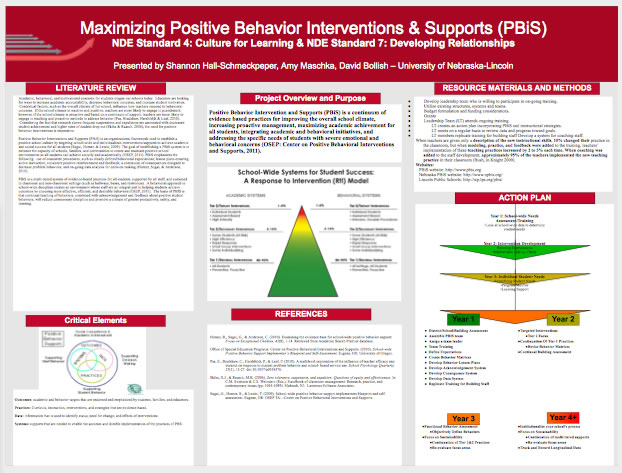Shannon Hall-Schmeckpeper, Amy Maschka, David Bollish
Academic, behavioral, and motivational concerns for students plague our schools today. Educators are looking for ways to increase academic accountability, decrease behavioral concerns, and increase student motivation. Contextual factors, such as the overall climate of the school, influence how teachers respond to behavioral concerns. If the school climate is reactive and punitive, teachers are more likely to engage in punishment; however, if the school climate is proactive and based on a continuum of support, teachers are more likely to engage in teaching and proactive methods to address behavior (Pas, Bradshaw, Hershfeldt & Leaf, 2010). Considering the fact that research shows frequent suspensions and expulsions are associated with decreased student achievement and higher rates of student drop out (Skiba & Raasch, 2006), the need for positive behavior interventions is imperative.
Positive Behavior Interventions and Supports (PBiS) is an organizational framework used to establish a positive school culture by targeting school-wide and individualized interventions/supports to achieve academic and social success for all students (Sugai, Horner, & Lewis, 2009). The goal of establishing a PBiS system is to enhance the capacity of schools, families, and communities to create and maintain positive school environments so all students can achieve socially and academically (OSEP, 2011). PBiS emphasizes the following: use of consistent procedures, such as clearly defined behavioral expectations; lesson plans ensuring active instruction; consistent positive reinforcement and feedback; a continuum of consequences designed to decrease problem behaviors; and on-going data analysis for decision making (Horner, Sugai, & Anderson, 2010).
PBiS is a multi-tiered system of evidence-based practices for all students, supported by all staff, and sustained in classroom and non-classroom settings (such as hallways, buses, and restrooms). A behavioral approach to school-wide discipline creates an environment where staff are an integral part in helping students achieve outcomes by choosing more effective, efficient, and desirable behaviors (OSEP, 2011). The basis of PBIS is that continual teaching of behaviors, combined with acknowledgement and feedback about positive student behaviors, will reduce unnecessary discipline and promote a climate of greater productivity, safety, and learning.
